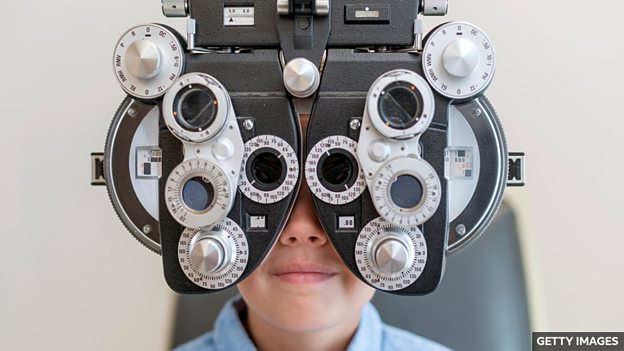随身英语
Rise in short-sightedness in children 儿童近视率上升

儿童近视率上升的原因是什么?本文就现代生活方式对儿童视力的影响,以及矫正儿童视力的解决方案展开讨论。
词汇:eye health 眼部健康
How's your eyesight? From the moment we're born, our eyes grow, our vision becomes clearer and some of us will have normal or even 20:20 vision. However, others will become short-sighted and end up wearing glasses or contact lenses to help them see everything clearly. And some experts claim that more of us will be wearing them in the future because of our lifestyle when we were younger.
Even today, optometrists are reporting a rise in short-sightedness – also called myopia – in children. The condition can be genetic, but it's also partly being blamed on a number of modern-day factors – particularly children staring at phone screens, computers and game consoles for long periods of time. It's believed myopia also makes them susceptible to secondary eye conditions such as glaucoma, retinal detachment and other visual impairments later in life.
Of course, children have had increased screen time due to lockdowns imposed during the Covid pandemic – it's been the only way to access education and communicate with others. But education generally could be blamed for the rise in myopia. Neema Ghorbani-Mojarrad, lecturer at the University of Bradford, told BBC Future website: "We suspect it is reading and spending more time indoors. Every year of education completed increases the expected amount of short-sightedness."
The problem appears to be more severe in some Asian countries. Some experts say that in these places with huge educational success, children spend more time indoors studying. Therefore, it seems, spending more time outdoors could be good for children's eye health. The UK's College of Optometrists is suggesting parents should get their kids playing outside for two hours a day. Several scientific studies show this can prevent or stop the development of myopia.
There's been a focus on using technology, such as laser surgery, for fixing myopia, but for children at least, it seems a dose of daylight and a break from the screen might be part of the solution. Opticians also recommend kids have regular eye tests to identify any problems before they become more severe.
词汇表
eyesight 视力
vision 视力,视觉
20:20 vision 正常裸眼视力
short-sighted 近视的
wear glasses 戴眼镜
wear contact lenses 戴隐形眼镜
optometrist 验光师,配镜师
myopia 近视
genetic 基因遗传的
secondary eye condition 继发性眼病
glaucoma 青光眼
retinal detachment 视网膜脱离
visual impairment 视觉障碍
screen time (看电视、电脑、手机等的)屏幕时间
laser surgery 激光手术
optician 配镜师,眼镜销售员
eye test 视力测试
测验与练习
1. 阅读课文并回答问题。
1. Give a modern-day factor that might cause children to be short-sighted.
2. True or false? Spending time indoors can be bad for children's eyesight.
3. True or false? Spending fewer years in education means you are more likely to develop short-sightedness.
4. Why do some experts suggest countries with huge educational success have more short-sighted children?
5. What should children do to help identify any eye problems before they become more severe?
2. 选择意思恰当的单词或词组来完成下列句子。
1. The fact that everyone in the family is tall must be _______.
genes genetical genetic genetics
2. You need to cut down on your _______ and go out for a walk.
eyesight glaucoma screen time glasses
3. We need to _______ on the current task before trying to do the next one!
focus focussing focuss focussed
4. I think I must be _______ – I can't read the road sign without my glasses.
visual impairment myopia 20:20 vision short-sighted
5. The _______ has prescribed me a new pair of glasses.
eye health eye test optician glaucoma
答案
1. 阅读课文并回答问题。
1. Give a modern-day factor that might cause children to be short-sighted.
Children staring at phone screens, computers and games consoles for long periods of time might cause them to become short-sighted.
2. True or false? Spending time indoors can be bad for children's eyesight.
True. The UK's College of Optometrists suggest children being outside for two hours a day is proven to prevent or stop the development of myopia.
3. True or false? Spending fewer years in education means you are more likely to develop short-sightedness.
False. Neema Ghorbani-Mojarrad, lecturer at the University of Bradford, said "Every year of education completed increases the expected amount of short-sightedness."
4. Why do some experts suggest countries with huge educational success have more short-sighted children?
Because children spend more time indoors studying.
5. What should children do to help identify any eye problems before they become more severe?
Opticians recommend children have regular eye tests to identify any problems before they become more severe.
2. 选择意思恰当的单词或词组来完成下列句子。
1. The fact that everyone in the family is tall must be genetic.
2. You need to cut down on your screen time and go out for a walk.
3. We need to focus on the current task before trying to do the next one!
4. I think I must be short-sighted – I can't read the road sign without my glasses.
5. The optician has prescribed me a new pair of glasses.



